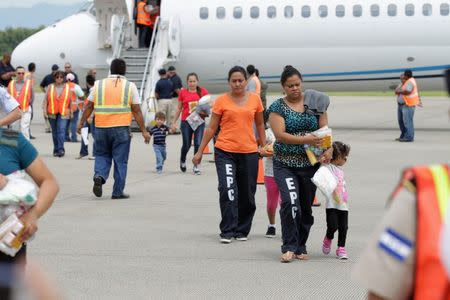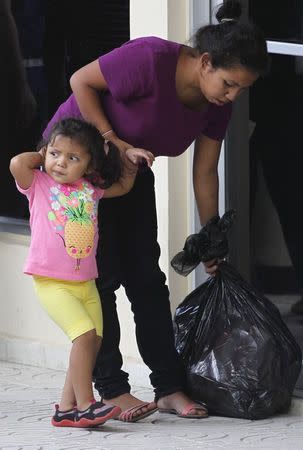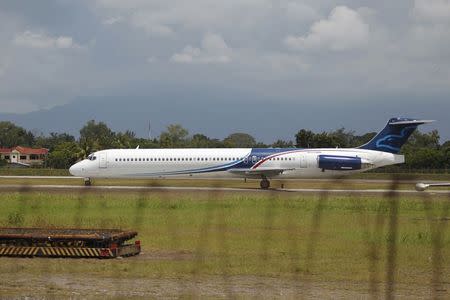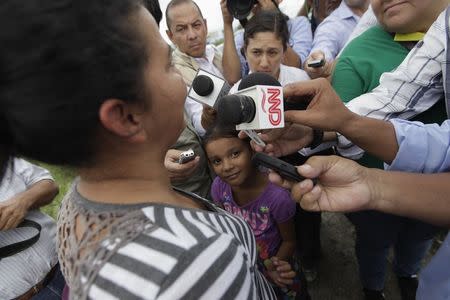U.S. says deportation of Honduran children a warning to illegal migrants
By Steve Holland and Gabriel Stargardter WASHINGTON/TEGUCIGALPA (Reuters) - The White House said on Tuesday that Central Americans trying to cross the U.S. border should know "they will not be welcome to this country," a day after the United States deported a planeload of women and children to Honduras. A charter flight on Monday from New Mexico to San Pedro Sula, the city with the highest murder rate in the world, transported 17 Honduran women, as well as 12 girls and nine boys between the ages of 18 months and 15 years. White House spokesman Josh Earnest said the return of the Hondurans should be a clear signal to those thinking about crossing the border illegally that "they're entitled to due process but they will not be welcome to this country with open arms." The return of the Hondurans was the most high-profile example of President Barack Obama's struggle to gain control of an influx of child migrants from Central America that is overwhelming immigration resources and leading to scattered protests from people angry at the government for housing some border-crossers in communities around the country. Organizations working with illegal migrants and Honduran youths said the U.S. flight was largely symbolic and would have little impact on Honduran children trying to escape a country racked by gang violence and the world's highest murder rate. "This is a problem about the country, about the conditions in the country," said Gerardo Rivera, a researcher for Casa Alianza, a youth organization in Honduras. "What they're looking for is to flee from dangerous situations, flee from poverty, flee from a lack of opportunities." Ana Garcia de Hernandez, the first lady of Honduras, called on the United States to provide "comprehensive support, not just small steps" to help the struggling nation tackle drug cartels she said were fuelling the exodus north. "The children, the young and their mothers are leaving areas where's more violence due to drug traffickers using our country as a transit point toward the United States," she said. The number deported on Monday was a drop in the ocean next to the wave of migrants flooding across the U.S.-Mexico border. More than 57,000 unaccompanied minors from Central America have been caught since October, twice as many as a year earlier. U.S. immigration officials said more people would be sent back to Honduras, Guatemala and El Salvador in the coming days but declined to give any details about the pace of deportations. Obama is attempting to balance competing interests: reassure Americans that the migrants, many of them unaccompanied children who have streamed into Texas across Mexico's border by the thousands, will be sent home, while making clear to immigration advocates that the children will be given due process of law. ARIZONA PROTEST The White House's Earnest said Obama did not personally approve the return of the Hondurans on Monday. It was a decision made by the Homeland Security Department, implementing a policy the president had set out, he said. The flood of unaccompanied migrants have added a toxic mix to a raging debate over whether to approve comprehensive immigration reform to cover some 11 million undocumented people in the United States. Reform is one of Obama's priorities, but it has no chance until after November congressional elections. Waving U.S. flags and playing patriotic music, dozens of protesters demonstrated in southern Arizona on Tuesday against the arrival of undocumented immigrants for processing at a center near the border before being returned to their homelands. In a scene reminiscent of protests in California, about 65 demonstrators gathered at a fork in the road near the small town of Oracle to complain that Washington's response to the Central America migrant surge was putting their communities at risk. The return of the Hondurans could help reassure Republicans that Obama is serious about controlling the frontier as he tries to persuade Congress to approve an emergency request for $3.7 billion to bolster border security and speed up deportations. The proposal has had a cool reception on Capitol Hill so far, with Republicans blaming Obama for the crisis and wanting more emphasis on border enforcement before giving him any money. IMMIGRATION BILLS House Republicans who think Obama's $3.7 billion request is too high are working to pare it down to a level that one Republican source said was likely to be about $2 billion. House Appropriations Committee Chairman Hal Rogers said appropriators were "combing through the numbers now trying to determine what kind of money is needed immediately both in terms of policy and cost, and what can wait." Two senators from the southwestern border state of Arizona were working on legislation that could help bring together lawmakers arguing over the emergency funds. Republican Senators John McCain and Jeff Flake were preparing a bill that, like another measure sponsored by two Texas lawmakers, Republican Senator John Cornyn and Democratic Representative Henry Cuellar, would make it easier to deport unaccompanied minors from El Salvador, Guatemala and Honduras. But McCain and Flake also would increase the number of refugee visas for those three countries. The idea is to discourage children from making the dangerous trip to the United States as illegal immigrants and instead encourage them to apply for entry into the United States in a safer, more orderly way. Under a 2008 anti-trafficking law, children from Central America cannot be turned away at the border but must be given a hearing to determine if they qualify for humanitarian relief. Many of Obama's Democratic allies oppose changing the law, fearing it would deny them the right to have their cases heard by an immigration judge and if sent home, could put them in danger from the criminal gangs that they had fled. "The backbone and commitment to justice of the strongest and most generous nation in the world is trembling at the presence of 50,000 children and responding by taking away legal rights from vulnerable children. It is shameful," Democratic Representative Luis Gutierrez said. But Representative Matt Salmon, a member of the Republican border security working group that visited Honduras and Guatemala over the weekend, said the best way to end the border crisis was to accelerate the return of unaccompanied minors. "If we don't send that message through our actions not our rhetoric, we will continue to have wave after wave after wave" of illegal immigrant children, Salmon said. (Additional reporting by Susan Cornwell, Jeff Mason, Julia Edwards, Richard Cowan and Patricia Zengerle in Washington, Gustavo Palencia in Tegucigalpa and Joanna Zuckerman Bernstein in Mexico City, editing by Ross Colvin and Ken Wills)







